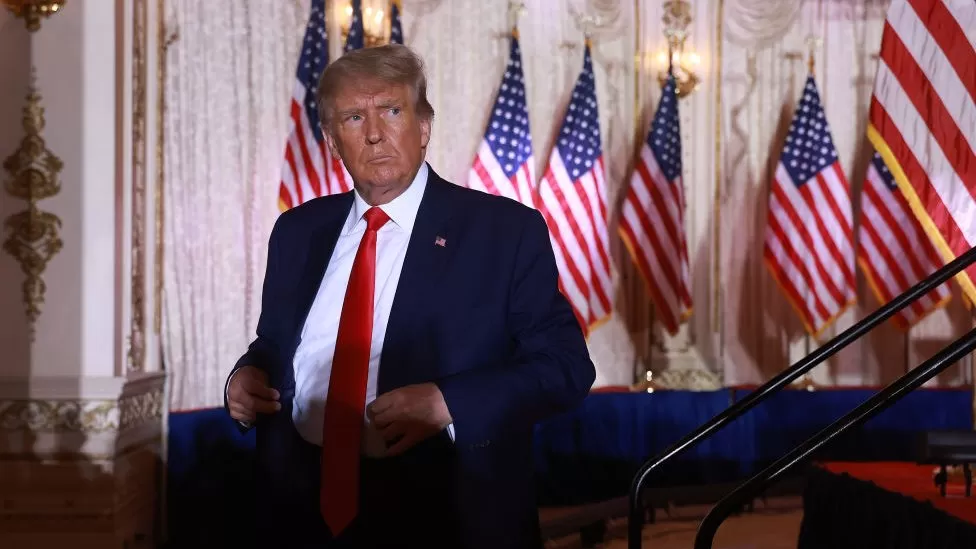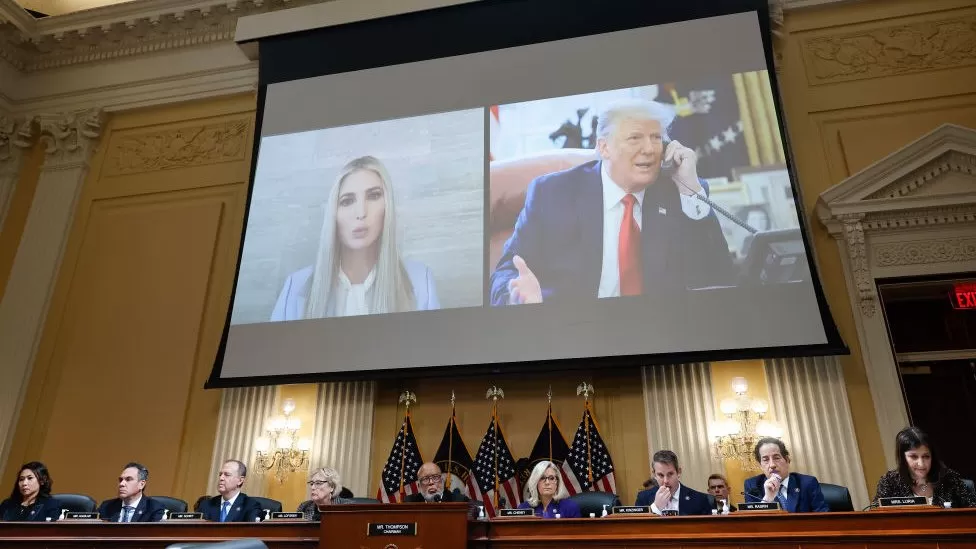
Donald Trump should be charged with crimes related to the assault on the US Capitol, according to the congressional committee investigating the 6 January, 2021 attack.
The committee claimed the former president instigated the attack by his supporters and provided “aid and comfort” to the rioters in violation of multiple federal laws. “None of the events of January 6 would have happened without him,” the summary of its final report says.
Members say there’s evidence to pursue the prosecution of Mr Trump on four charges:
Obstruction of an official proceeding
Conspiracy to defraud the United States
Conspiracy to make a false statement
Inciting, assisting, aiding, or comforting an insurrection
The vote provided a dramatic finale to an 18-month inquiry into the chaotic last days of Mr Trump’s presidency – but the implications for him will be mostly political, not legal.
A gesture, not an indictment
If Mr Trump were convicted of the crimes the committee has accused him of committing, he could face hundreds of thousands of dollars in fines, up to 20 years in prison and be prohibited from running for future political office. The committee’s vote, however, is largely symbolic.
Congress does not have the ability to charge Mr Trump with any of the listed federal crimes. That power lies solely in the hands of the US Justice Department, which is part of President Joe Biden’s administration.
With its vote, the congressional committee members have, in effect, recommended the Justice Department act. They have laid out the case – the means, the motive and the opportunity – as they see it. And, perhaps most importantly, they have provided a trove of the supporting evidence gathered over nearly two years of interviews, subpoenas, document reviews and legal battles.
What the Justice Department does with all this, however, is entirely out of the committee’s control.
Trump’s legal woes
While the January 6 committee’s recommendations may have little legal weight, there are plenty of indications that the Justice Department is already well into the kind of investigation of possible criminal conduct by the former president that the committee desires.
A grand jury convened by federal attorneys has already issued subpoenas to dozens of Mr Trump’s administration and campaign officials and requested many of the same Trump administration documents reviewed by the congressional committee.
Last month, US Attorney General Merrick Garland appointed a special counsel, Jack Smith, to handle all aspects of the inquiry into the former president. He cited Mr Trump’s announcement of his 2024 presidential bid, and the possibility that Mr Trump could face off against Mr Biden in the general election, as grounds for separating the investigation from the Justice Department’s day-to-day operations.
Since then, Mr Smith’s office has issued its own subpoenas to officials in seven states who had been contacted by Mr Trump or his advisers during their attempts to dispute the 2020 presidential election results. The independent council investigation appears to be wasting little time picking up where career Justice Department lawyers left off.
The Capitol attack is not Mr Trump’s only source of legal concern, either. Mr Smith is also investigating the former president’s handling of classified material at his Mar-a-Lago estate after he left office. A Georgia district attorney continues to dig into whether Mr Trump’s contact with state officials violated Georgia election law. And there are a host of civil cases too.
Political fallout
Mr Trump has long attempted to paint the entirety of the criminal and civil investigations and lawsuits directed at him as part of a partisan “witch hunt” whose ultimate goal is to thwart his return to political power.
The nature of the congressional committee’s criminal referral – voted on by seven Democrats and two vehemently anti-Trump Republicans – will do little to counter these claims, and may in fact be cited by Mr Trump as further evidence of the partisan nature of the allegations if and when they turn into actual criminal charges.
The referrals, however, will generate days of negative coverage for Mr Trump, as newspaper and television headlines recount the nature of the recommended charges and remind Americans of the violence of 6 January and Mr Trump’s months-long efforts to challenge his election defeat.
Already, there are indications that Mr Trump may be facing increasingly stiff political headwinds as he tries to gear up another bid for the presidency in 2024. Recent polls show that he continues to be unpopular with vast swaths of the American public, and that his support is dropping even among Republican voters. Hypothetical head-to-head election matchups show him losing ground to Florida Governor Ron DeSantis for the Republican presidential nomination and trailing Mr Biden in a general election contest.
Since announcing his presidential bid just a week after the Republican Party and Mr Trump’s handpicked candidates underperformed in the November 2022 midterm congressional elections, Mr Trump has taken few visible steps to advance his campaign efforts. While there are rumours of hirings and talk of new policy announcements, the biggest news came from the former president’s touting of Trump-themed action-hero digital collector cards, sold for $99 apiece.
As the calendar turns to 2023, and the Republican presidential nomination contest comes into focus, Mr Trump may require some remarkable feats of political strength to regain his political footing.






















